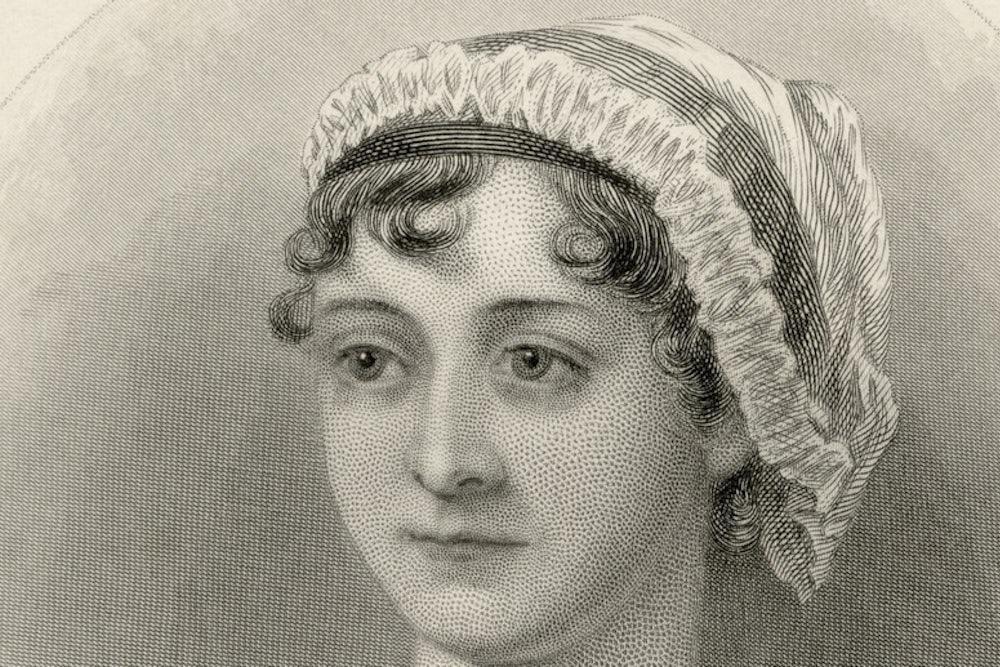One hundred ninety-seven years ago to this day, Jane Austen died far too young at the age of 41. Mildly successful in her lifetime, Austen—as we all well know—went on to become one of the world's most famous and beloved novelists. She left behind only one unfinished novel that we know of, Sanditon, and a well of mystery so deep that renowned biographers still struggle to fill 400 pages on her life.
In 1924, another British female novelist who would break the mould—Virginia Woolf—penned an elegy to the Divine Miss Jane in our pages. The true sadness of Jane Austen's life, Woolf writes, was that had she lived longer, we might have seen a great change in her work.
It is impossible to say too much about the novels that Jane Austen did write; but enough attention perhaps has never yet been paid to the novels that Jane Austen did not write. Owing to the peculiar finish and perfection of her art, we tend to forget that she died at 42 [sic], at the height of her powers, still subject to all those changes which often make the final period of a writer’s career the most interesting of all.
Woolf then goes on to explore the changes in Austen's writing that she observed in her last completed work, Persuasion, as a method for understanding Austen's evolution.
There is a peculiar dullness and a peculiar beauty in Persuasion. The dullness is that which so often marks the transition stage between two different periods. The writer is a little bored. She has grown too familiar with the ways of her world. There is an asperity in her comedy which suggests that she has almost ceased to be amused by the vanities of a Sir Walter or the snobbery of a Miss Elliott. The satire is harsh, and the comedy crude. She is no longer so freshly aware of the amusements of daily life. Her mind is not altogether on the subject. But, while we feel that Jane Austen has done this before, and done it better, we also feel that she is trying to do something which she has never yet attempted. There is a new element in Persuasion, a quality, perhaps, that made Dr. Whewell fire up and insist that it was "the most beautiful of her works."
She is beginning to discover that the world is larger, more mysterious, and more romantic than she had supposed. We feel it to be true of herself when she says of Anne: "She had been forced into prudence in her youth, she learned romance as she grew older—the natural sequel of an unnatural beginning." She dwells frequently upon the beauty and the melancholy of nature. She talks of the "influence so sweet and so sad of autumnal months in the country." She marks "the tawny leaves and withered hedges."
"One does not love a place the less because one has suffered in it," she observes. But it is not only in a new sensibility to nature that we detect the change.Her attitude to life itself is altered. She is seeing it, for the greater part of the book, through the eyes of a woman who, unhappy herself, has a special sympathy for the happiness and unhappiness of others, which, until the very end, she is forced to comment upon in silence. Therefore the observation is less of facts and more of feelings than is usual. There is an expressed emotion in the scene at the concert and in the famous talk about woman's constancy which proves not merely the biographical fact that Jane Austen had loved, but the aesthetic fact that she was no longer afraid to say so.
And then Woolf more generally mourns the momentous changes to her writing that fame and an evolving intellect would have brought.
She would have stayed in London, dined out, lunched out, met famous people, made new friends, read, travelled, and carried back to the quiet country cottage a hoard of observations to feast upon at leisure. And what effect would all this have had upon the six novels that Jane Austen did not write? She would not have written of crime, of passion, or of adventure. She would not have been rushed by the importunity of publishers or the Battery of friends into slovenliness or insincerity. But she would have known more. Her sense of security would have been shaken. Her comedy would have suffered. She would have trusted less (this is already perceptible in Persuasion) to dialogue and more to reflection to give us a knowledge of her characters. Those marvelous little speeches which sum up in a few minutes' chatter all that we need in order to know an Admiral Croft or a Mrs. Musgrove forever, that shorthand, hit-or-miss method which contains chapters of analysis and psychology, would have become too crude to hold all that she now perceived of the complexity of human nature. She would have devised a method, clear and composed as ever, but deeper and more suggestive, for conveying not only what people say, but what they leave unsaid; not only what they are, but (if we may be pardoned the vagueness of the expression) what life is. She would have stood further away from her characters, and seen them more as a group, less as individuals. Her satire, while it played less incessantly, would have been more stringent and severe. She would have been the forerunner of Henry James and of Proust—but enough. Vain are these speculations: she died “just as she was beginning to feel confidence in her own success.”
